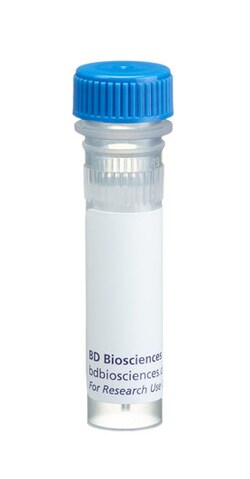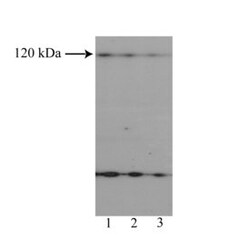Learn More
NF-ATc2 Mouse, Unlabeled, Clone: 4G6-G5, BD
Mouse Monoclonal Antibody
Supplier: BD Biosciences 556601
Description
The NF-AT family of transcription factors are regulators of early immune response genes in T cells following their activation by CD40L, FasL and interleukins including IL-2, -3, -4 and -5. NF-AT proteins function in both signal transduction and transcription control. The DNA binding, active NF-AT complex contains a cytoplasmic, Ca2+/calcineurin dependent, cyclosporin sensitive subunit, designated NF-ATc, which is present in the cytoplasm of resting cells. Upon cell activation, NF-ATc is dephosphorylated and thus activated by calcineurin, resulting in rapid translocation of NF-ATc to the nucleus. The active NF-AT complex also contains a nuclear component, designated NF-ATn. In vitro, NF-AT cooperates with the mitogenic transcription factor AP-1 to induce multiple cytokine genes. NF-ATc is encoded by four genes: NF-ATc1 (originally named NF-ATc), NF-ATc2 (originally named NF-ATp), NF-ATc3 (NF-AT3), and NF-ATc4 (NF-AT4). These proteins are differentially expressed in tissues, suggesting that each may activate distinct sets of genes. NF-ATc2 is constutively expressed in resting immune cells. NF-ATc2 is required for the development of Th2 responses and plays a role in the production of IL-4.
Host Species: Mouse
Clone: 4G6-G5
Isotype: IgG2a
Cross Reactivity: Human, Mouse
Western Blotting

Specifications
| NF-ATc2 | |
| Monoclonal | |
| 0.5mg/mL | |
| NFAT1; NFATP; KIAA0611 | |
| Mouse | |
| Affinity Purified | |
| RUO | |
| Primary | |
| Store undiluted at 4°C |
| Western Blot | |
| 4G6-G5 | |
| Unconjugated | |
| Aqueous buffered solution containing ≤0.09% sodium azide. | |
| Human NF-ATc2 aa. 433-567 Peptide | |
| 0.1 mg | |
| Cell Biology | |
| Human, Mouse | |
| IgG2a κ |
Your input is important to us. Please complete this form to provide feedback related to the content on this product.
For Research Use Only.

